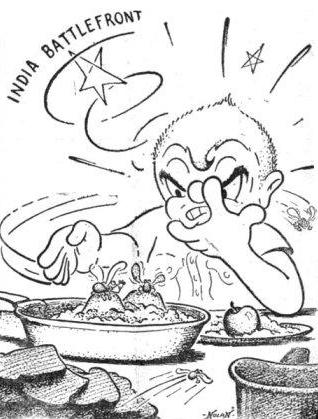
VOL. I NO. 9 DELHI, THURSDAY NOVEMBER 12, 1942.
Back in 1923 Japan got hit by a major-league earthquake. We hope to hell she gets hit again plus, but 19 years ago we reacted as Americans always do when they see a people at home or abroad in distress by reason of a cataclysm of nature. The U.S.A. rushed to the rescue. All the Man in the Street could give was dough - but he gave plenty - and the Red Cross put it to work. There's a more immediate job for us now here in India, to help some hard-luck guys and gals who just got smacked by Messers. Boreas, Pluvius and Co. in a Bengal cyclone. It happened three weeks ago and we are just now getting details because releasing the story when it happened might well have given aid and comfort to the enemy. There are plus 10,000 dead in the areas affected, the general picture can be digested in a few paragraphs from a recent newspaper: "Not a house stands intact while the majority of houses have collapsed. If a tree has not been uprooted or broken down it stands bear without leaves. "Pathetic wails were heard from women whose husbands and children had died, and whose only wealth - cattle - had been destroyed. Even three weeks after the havoc, carcasses of cattle are being buried. Tanks have been putrefied by leaves from trees. Fishes died in abundance. "We saw a number of people who came to us for doles. Distressed people want seeds for winter crops. They want money for the reconstruction of their broken houses. The immediate need is for food for the hungry and drugs for the sick." the paper said. There is it. Action is demanded. We admit we're going off half-cocked on this. When the heart calls to hell with Red Tape. We don't know whether it is a job for the Indian Red Cross or some agency of the Indian government. We only know the need is IMMEDIATE and we will guarantee that every chip tossed into the hat will get to the people who need it. Send your contributions to The Editor, C.B.I. Roundup, New Delhi, India. The Roundup staff is opening the pot with Rs. 100. |
American soldiers scattered throughout the Naga Hills watching for enemy planes have a new ally - head hunters!
According to an officer just returned from an inspection trip of the American radio air raid warning network in these hills, the United States air force in India several months ago set out to overcome the mountain barrier hampering radio detection of the enemy.
Capt. James A. Kehoe, a thin, wiry Irishman, pioneered the service which now warns American bases in Assam of the approach of the enemy. Kehoe slogged through rain-soaked hills choosing look-out sites, surveying possible roads up precipitous jungled mountains that Jeeps had great difficulty negotiating and there made friends with naked, betel-chewing Naga head hunters.
SOLDIERS CAME
During the World Series Kehoe said he heard the crack of the St. Louis Cardinal bat that won the series on a portable radio from a mountain-top Naga village where he reclined.
Behind Kehoe came American soldiers, helped by grinning, chanting Nagas who built what has been termed the steepest and most dangerous road in the world where only Jeeps are able to travel. Way stations for stranded drivers were established with difficulty. Nagas were directed to build look out huts of bamboo on the hill tops.
Naga children delight in riding on Jeeps over rare level areas while their parents have placed votive offerings of bamboo, feathers and rice at each treacherous curve to protect Americans from death. Some American stations are a two-day march into the hills.
STILL HUNT HEADS
Lt. Lucien L. Hall says that relations with the head hunters are of the friendliest although they still hunt heads.
"I was investigating trails with an interpreter a while back," he is reported to have said, "When a Naga chief invited me into his hut to show me his 70 skulls. Listening to his palaver I thought he was bragging until the interpreter informed me that the chief was apologizing for the shortage of his stock, explaining that he had 200 skulls in his Basha hut which burned. He begged me to return soon and promised to have his collection back to 100."
Another Naga chief near an American station warned soldiers to keep clear of handsome, bare-breasted Naga women, making a strangely reminiscent gesture across his throat with his thumb. Whether it be the warning or the betel stained lips of lovelies, our boys are staying on their own reservations, it is reported.
NAGA DICTIONARY
Lieuts. Donald Hartberg and Kenneth Glaisdell are compiling a Naga-English dictionary and studying the Naga signal drum code. The Nagas are rapidly picking up American phrases, are interested in the American way of living and swarm in and out of American quarters and have now added "scram" and "OK" as permanent fixtures to their vocabulary.
Americans are already the equal of the Nagas with their crossbows, it was reported, but can't match them in spear throwing. Hartberg had to order crossbow contests stopped recently as flying arrows were becoming a menace to the camp.
A recent visitor, who appears to have come to stay, has arrived at one of the American camps. He is a large black ape who growls at the Americans, but accepts their food. He has refused other social contact to date, however.
An American cook who taught
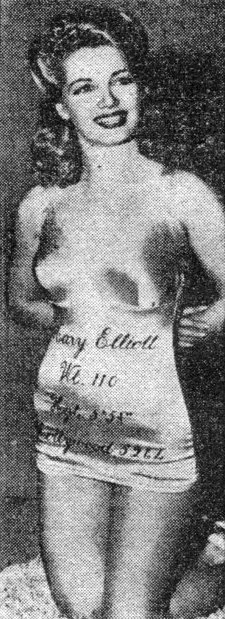 WHAT, NO FINGER PRINTS! - Instead of putting a starlet's dimensions on the back of those pictures in the studio
casting files, they are writing them across their lovely little tummies as witness Mary Elliot above.
WHAT, NO FINGER PRINTS! - Instead of putting a starlet's dimensions on the back of those pictures in the studio
casting files, they are writing them across their lovely little tummies as witness Mary Elliot above.
|
GOOD SPOTTERS
When it comes to aircraft spotting, however, the Nagas best the Americans at their own game - spotting enemy aircraft. When their sharp ears or eyes detect the presence of planes they shout "limpoo" sometimes a good minute before the Americans pick up the sound. When the craft are spotted the Nagas immediately want to know whether they are Japs or Americans.
The Nagas earn 12 cents a day hauling American supplies in baskets slung over their backs and suspended from their foreheads. For some strange reason, however, they would much rather receive their payment in tin cans.
The common sardine key has now become an ornament highly sought after for the personal adornment of Naga male and belle alike. They wear them dangling from extended ear-lobes or merely stuck through holes pierced in ears or nose with square headed bolos carried by every native.
In the evenings Americans lie resting in these lush, jungle-covered hills listening to a strange symphony caused by the musical blendings of San Francisco radio stations and the blood-chilling pounding of native signal drums echoing throughout the valleys and soaring over the peaks.
Americans like their life with the Nagas who "don't know much about the Japs but anything American is 'OK.'"
U.S. BOMBERS HIT RANGOON
Tenth U.S. Air Force bombers successfully attacked the Kemmendine docks and shipping at Rangoon on November 6.
The attack was made in midday and from high altitude. Many large caliber bombs were dropped. Although clouds obscured part of the target area, hits were observed on warehouses, and a small ship received a direct hit.
The enemy apparently was taken completely by surprise. His anti-aircraft fire was weak and no interception was noted. All of our aircraft returned to their bases without damage, according to a communique issued in New Delhi.
U.S. AGAIN HITS RANGOON
Bombers of the Tenth Air Force on November 9th again heavily bombed docks and warehouses in a midday raid on Rangoon and Syriam.
Many large fires were observed on both sides of the river by returning crews. In contrast to the raid of November 5th when the enemy was taken completely by surprise, the American planes were obliged to fly through accurate anti-aircraft fire.
Three enemy fighters were seen in the area but only one fighter attempted to attack. It was driven off by our rear gunners. All of our planes and crews returned safely to their bases, according to a communiqu from Brig. Gen. Clayton Bissell.
IT TOUGH FOR HIROHITO
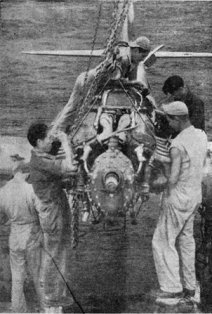 KEEP 'EM FLYING - These P-40's up in China have got to keep on flying. They've done so well to date that the
Jap air force has been virtually run out of the country. Here S/Sgt. Benjamin Ramire and S/Sgt. M. A. Smith,
with the help of Chinese mechanics, change engines.
KEEP 'EM FLYING - These P-40's up in China have got to keep on flying. They've done so well to date that the
Jap air force has been virtually run out of the country. Here S/Sgt. Benjamin Ramire and S/Sgt. M. A. Smith,
with the help of Chinese mechanics, change engines.
|
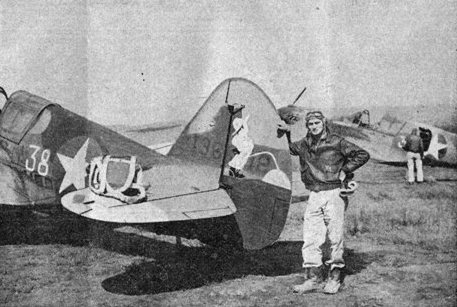 CENSORED ON THE RISING SUN - When it comes to Japanese nationalism our China Air Task Force pilots are definitely
irreverent. Here Lt. Dallas A. Clinger (upper right) demonstrates what he thinks of the Rising Sun. Take
a gander at the rudder of his ship. What the little guy with the big hat is doing to the Japanese emblem our
boys in China, India and the Southwest Pacific are doing to him in person. You better not send this home to
mother.
CENSORED ON THE RISING SUN - When it comes to Japanese nationalism our China Air Task Force pilots are definitely
irreverent. Here Lt. Dallas A. Clinger (upper right) demonstrates what he thinks of the Rising Sun. Take
a gander at the rudder of his ship. What the little guy with the big hat is doing to the Japanese emblem our
boys in China, India and the Southwest Pacific are doing to him in person. You better not send this home to
mother.
|
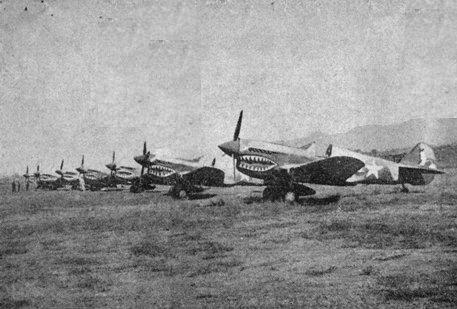 THE SHARKS - Lined up ready to go are a flight of the shark-toothed P-40's used so effectively by the China Air Task
Force. The shark faces are a hold-over from the A.V.G. days. These babies have been knocking the Japs down
at a ratio of about six to one.
THE SHARKS - Lined up ready to go are a flight of the shark-toothed P-40's used so effectively by the China Air Task
Force. The shark faces are a hold-over from the A.V.G. days. These babies have been knocking the Japs down
at a ratio of about six to one.
|
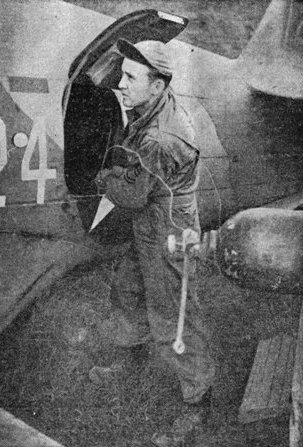 HIGH FLYING - Those extreme altitudes, especially over the "Hump" call for some oxygen once in a while. T/Sgt.
J. T. Harden is shown loading oxygen into a pursuit plane.
HIGH FLYING - Those extreme altitudes, especially over the "Hump" call for some oxygen once in a while. T/Sgt.
J. T. Harden is shown loading oxygen into a pursuit plane.
|

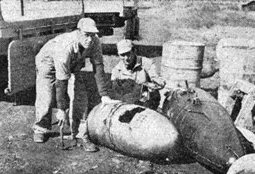
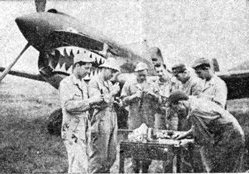 EMPHASIS ON THE GROUND CREWS - A lot of pilots say that they shouldn't get the credit for shooting down the Japs.
They say that the unromantic grease monkeys who keep them in the air are the ones who should get the cheers.
Straddling the nose of a P-40 is T/Sgt. William E. Blissitte. Salvaging fittings from old belly tanks
are M/Sgt. W. Hirsch (right) and S/Sgt. C. E. Lehman. The combat crew on the right shown cleaning a P-40 gun is
composed of S/Sgt. P. Koerner. Sgt. Allen Russell, Sgt. Lewis Homoky, S/Sgt. R. L. Hake, Pvt. Lewis S. Rakay,
Casazza and T/Sgt. F. H. Parkerson.
EMPHASIS ON THE GROUND CREWS - A lot of pilots say that they shouldn't get the credit for shooting down the Japs.
They say that the unromantic grease monkeys who keep them in the air are the ones who should get the cheers.
Straddling the nose of a P-40 is T/Sgt. William E. Blissitte. Salvaging fittings from old belly tanks
are M/Sgt. W. Hirsch (right) and S/Sgt. C. E. Lehman. The combat crew on the right shown cleaning a P-40 gun is
composed of S/Sgt. P. Koerner. Sgt. Allen Russell, Sgt. Lewis Homoky, S/Sgt. R. L. Hake, Pvt. Lewis S. Rakay,
Casazza and T/Sgt. F. H. Parkerson.
|
|
By SGT. K. W. MARTINDALE
Finals of the Air Depot mixed boxing tournament finished in a blaze of glory as over 20 silver cups were handed to the winners and runners-up by General Wilcox, British General Officer Commanding this area.
The presentation ended three nights of fights between American white and colored soldiers, British soldiers and local civilians.
Best fight of the evening was the last as Sgt. R. Giuree and Corp. Simon Hernandez battled it out for the lightweight cup, with Giuree getting the nod. Bulk of the rest of the bouts were disappointing as the boys seemed to hold their fire for fear they might hurt their pals.
Evening started with A. Jphet annexing the flyweight title from M. Rozario, both civilians. Second bout saw a little more excitement as Louis Lipinski KO'd G. Ursolovith in the second round to lead in the bantamweight class. Milton Johnson then knocked Ashley Fermie around the ring to take the featherweight cup.
In an extra bout, G. Fisher handled Henderson Brooks easily. The middleweight clash saw Emmit Lanier out-box Charles Sams in a "love feast." G. Sellers, KO'd the night previously, came back to out-roundhouse W. Skilling, a British G.I. Joseph Smith and Arthur Gray danced around the ring for three rounds in a bout that was more like a Mickey Mouse than anything else, with Smith ending up as top man in the score.
Pvt. Charles James showed up for a grudge fight, but his opponent didn't, so he was paired with F. Higgins in an extra, and gallantly did his best against much stronger opposition. Evening ended up on a merry note as H. Beach waltzed around the ring with L. Harris for the heavyweight cup.
|
With the baseball season having experienced an "Indian Summer" this year, a fitting climax is the game scheduled on an inter-city, inter-post scale between the hardball teams of the Tenth Air Force Headquarters and the G.I.'s of an Air Depot.
A three game series has been planned, the first game being an "At Home" for the Tenth Air Force this Sunday at Lady Harding Field. The boys from the Air Depot are traveling from their home station by bus - in good old baseball style (?). The return match will then move to their field on a succeeding Sunday for a possible double-header.
Judging from exhibitions of slugging and good pitching which have been in evidence this season, the series should provide plenty of thrills and excitement. So, see you at the game boys!
AIR DEPOT HOLDS CHORAL CONCERT
Something new took place in ancient India when a chorus of 250 Negro singers gave a recent concert of spirituals in a local church for members of an Air Depot.
There were three quartettes from Companies B and C of the Engineers' Battalion. Special song leaders for the chorus numbers were Pfcs. Washington and Johnson, Corporal Everett and Chaplain Meikle.
Following the concert the singers entertained American soldiers in a nearby hospital.
The singers plan to hold other concerts in and around their home station.
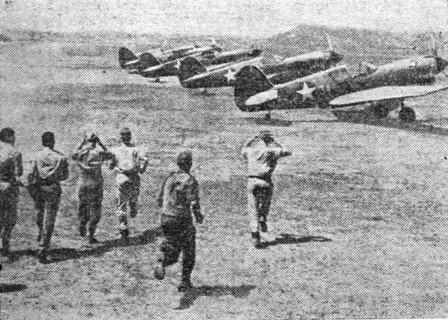 AIRMEN IN ACTION - Pilots of the U.S. Army Air Force race to their planes somewhere in China, following a radio
warning of approaching Japs.
AIRMEN IN ACTION - Pilots of the U.S. Army Air Force race to their planes somewhere in China, following a radio
warning of approaching Japs.
|
By Corp. JACK BLUMENFELD
OUR PUBLIC - Headquarters Supply Sergeant, Bruno J. Nicknadarvich last saw his friend, Corp. Stephen L. Verb about two years ago. Lately they have lost track of each other. Sunday, however, "Nick" received a letter from Verb, who is also in India, congratulating him on making Sergeant. Verb had read about "Nick's" promotion in the Silhouettes.
And the story comes in from one of our Weather Stations, through T/Sgt. David Magilavy, that two of the boys on detached service, Corp. P. T. Smith and Pfc. Donald A. McCollum, first learned of their respective ratings from the Silhouettes. It was not until a week later that they received official notice - Slow mails and... SCOOP!
KENTUCKY COURTESY - Pfc. Marvin Collins is a model of Southern hospitality. He was pedaling along on his bicycle one afternoon when he saw Major General Wheeler walking briskly along, and here's his story: "General, do you want to ride the rumble?" I asked. "No, thank you," he answered, "I don't get enough exercise that way." I would have liked to have given him a hitch.
NORTH AFRICAN DOPE - One of our British friends tells us the story of the Australian scout, out on desert patrol with just a radio transmitter and a camel, who sent the message: "Rommel, captured." He received an immediate reply: "Request further information on Rommel's capture." "So sorry," he wired back to Hq., "For Rommel captured read camel ruptured."
BY GEMINI - Corp. Joe McCrone just received his horoscope, sent him by his best buddy back home. It tells him that since he was born between May 22 to June 21, he was under the influence of Gemini. It goes on to say: "A new interest, a trip, or new, stirring development helps you snap out of fatigue and even sickness. Your environment must be very congenial and pleasant or it will have a most depressing effect upon you, in every way. For this reason, make sure that you are satisfactorily located..." Commented Joe: "I know of a nice place in Pennsylvania..."
PUZZLE CORNER - Remember last week's problem? Don't get mad if we tell you that the salute, according to Sgt. Elliott, would look just like "a grasshopper with wooden legs husking seeds out of a cucumber."
PROMOTION - Solitary promotion of the week was that of Joe McDowell. "Red" is now a Staff Sergeant.
TRAVEL DIFFICULTIES - Right-hand drive and bearing to the left on roads may be odd to us but the English visiting America have run into similar difficulties, but worse. They have had particular trouble with signs: "Soft Shoulders," "Sharp Curves Ahead," and "Six Gals for One Dollar," are but a few. Most shocking: "Try Ethyl."
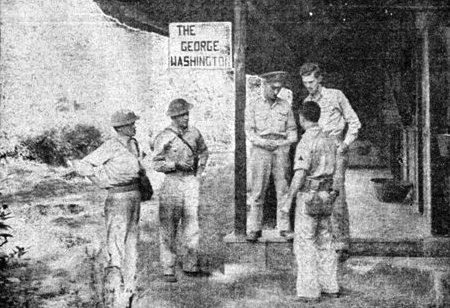 STRICTLY ON THE PLUSH - The boys up in Assam have just moved into new living quarters. They're so impressed
with what they've got that they've named the joint The George Washington. Posing for no particular reason as
far as we can see are Lt. Charles C. Flora, S/Sgt. Jacob M. Kushner, Lt. Glenn L. Smith, Capt. Robert T. Rose and Lt.
Robert L. Dabolt.
STRICTLY ON THE PLUSH - The boys up in Assam have just moved into new living quarters. They're so impressed
with what they've got that they've named the joint The George Washington. Posing for no particular reason as
far as we can see are Lt. Charles C. Flora, S/Sgt. Jacob M. Kushner, Lt. Glenn L. Smith, Capt. Robert T. Rose and Lt.
Robert L. Dabolt.
|
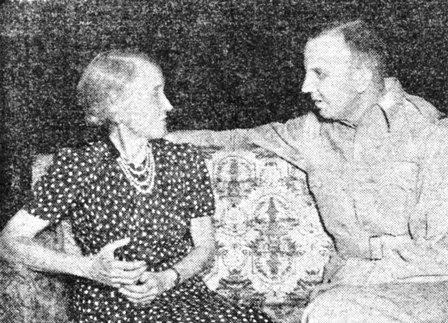 THEY MET IN INDIA - Lt. Ferris A. King of the United States Air Forces in India, knew he had an aunt in the country
all right, but he'd never seen her. They met in New Delhi a while back. Her name is Miss Clara Louise
Seiler and she has lived in India for 33 years.
THEY MET IN INDIA - Lt. Ferris A. King of the United States Air Forces in India, knew he had an aunt in the country
all right, but he'd never seen her. They met in New Delhi a while back. Her name is Miss Clara Louise
Seiler and she has lived in India for 33 years.
|
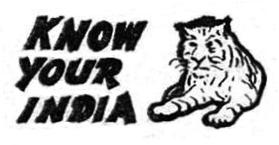
Indians want us to win. No group in the country has any love for the Axis. But Indian politics have been bitter and complicated. Sometimes party considerations overshadow matters of national importance, as has sometimes happened in our country. You may be asked to express an opinion on some question of Indian politics and this may prove a little ticklish because it is hard for an outsider to understand all the different sides of the argument.
The complicated problem of Indian politics can be settled only by those directly concerned with it. Just as we would not like to have outsiders express themselves on our internal affairs, so Indians may not like to have us tell them where to get off in the field of politics.
Right now India is threatened just as we are threatened, and our very presence in India may help draw all Indians together into the common cause. Indians have been fighting bravely since the start of the war, and every day are getting behind the war effort with increasing force. If we can win the trust and friendship of all Indians, if we and they co-operate, the example will help Indian factions to unite inside their own country. And if Indians can do it, all the world can take heart and do likewise.
There are three seasons in most of India. The cool weather (some call it "cold") lasts from October to the end of February. The hot weather begins in March and continues into June. The rainy season ("the rains") starts in June and goes on to the end of September. The climate depends on the locality a good deal, and in the mountains it gets really cold.
There are two main health rules to remember. Be careful about the sun and watch the drinking water. The sun is stronger in India than at home, stronger than you may think, so wear some kind of head covering whenever you are in the sun, even if you are only out for a few minutes. All drinking water should be boiled or chemically purified. Tea is usually safe. Even the bottled soft drinks may be contaminated unless they come from one of the larger and supervised plants. The same goes for food. When you are away from your outfit's own kitchens, eat only food that has been peeled or boiled.
There are three main geographic divisions, the mountains on the north, the plains which fit inside the mountains, and the rocky plateau which covers most of the peninsula.
A solid range of mountains extends like a wall across the whole northern boundary of India. The mighty Himalayas stretch southeast from Kashmir to Assam and other ranges extend southwest from Kashmir through Baluchistan to the Arabian Sea. From these mountainous regions come many fine soldiers. Gurkhas from Nepal, Pathans from the Northwest Frontier Provinces, Dogras from Kashmir, Garhwalis from the United Provinces, and many others.
Just below the mountains are the two great plains, the valleys of the Ganges River and of the Indus River. The Ganges Valley is the most densely populated part of the country and contains much of the industry. The Ganges flows through the United Provinces, across Bihar, and reaches the sea through Bengal.
Bengal has more than 60 million people, and its capital Calcutta (population over one million) is the second largest city of the British Empire. The first university in India was established here and Bengalis have made great contribution as scholars and authors. Although the same language is spoken throughout the province (the word Bengali may mean either the language or one who speaks it) the people are of different religions. About 55 percent are Moslems and 43 percent are Hindus.
East of Bengal and the easternmost province of India, Assam, is now very important to us. Tea is the chief product, grown mostly in the valley of the Brahmaputra River. The tribesmen of the Assam hills are fierce fighters and have only recently been brought into contact with civilization.
Up the Ganges Valley, west of Bengal is the province of Bihar. Its 28 million people are largely Hindu. The United Provinces have 55 million, 85 percent of them Hindu. The holiest city in India, Benares, is here, also historic places like Agra, Multra, Lucknow. Cawnpore is an important center of industry.
Further up the Ganges Valley is the capital city Delhi (now New Delhi) near the divide between the Ganges plain and the valleys of the Punjab. The word Punjab means "five rivers" and this northern province holds the five streams which come together to form the Indus. The 28 million people of this province are mostly Moslem, with about 7 million Hindus, and almost 5 million Sikhs. The people of the Punjab have always been great soldiers. About two thousand years ago they put up a stiff fight against the invasion of Alexander the Great. They have fought every other invader since then, and they now form a good part of the Indian army.
The C.B.I. Roundup is a weekly newspaper published by and for the men of the United States Army Forces in China, Burma, and India, from news and pictures supplied by staff members, soldier correspondents, Office of War Information and other sources. The Roundup is published Thursday of each week and is printed by The Statesman in New Delhi, India. Editorial matter should be sent directly to Capt. Fred Eldridge, Branch Office Hq., U.S.A.F. C.B.I., New Delhi, and should arrive not later than Monday in order to make that week's issue. Pictures must arrive by Sunday and must be negatives or enlargements. Stories should contain full name and organization of sender.

NOVEMBER 12, 1942
Adapted from the original issue of CBI Roundup
Copyright © 2009 Carl Warren Weidenburner
TOP OF PAGE PRINT THIS PAGE ABOUT THIS PAGE SEND COMMENTS
PREVIOUS ISSUE CLOSE THIS WINDOW NEXT ISSUE

